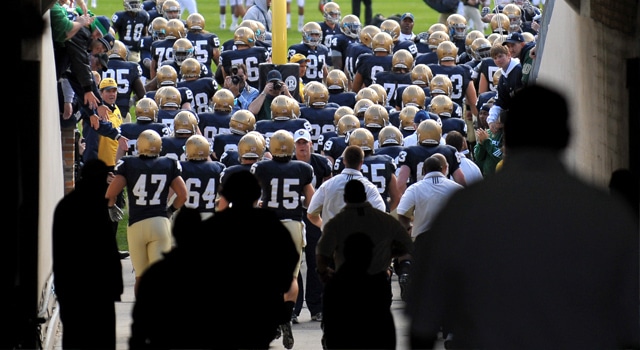

This is article is provided courtesy of Lisa Kelly at No Coast Bias. Be sure to check out the rest of her “Where Are They Now” series which catches up with Irish players from past years.
For someone who wanted an Ivy League education more than playing college football, Shawn Wooden’s successful nine-year NFL career may seem to be something of a surprising accomplishment. The Philadelphia native played cornerback at Notre Dame, memorably batting down a pass from eventual Heisman Trophy winner Charlie Ward to preserve an epic 1993 win over Florida State. He moved on to play defensive back for the Miami Dolphins and Chicago Bears, eventually retiring in 2004 because of a back injury. Now a financial planner with MetLife, Wooden lives in Fort Lauderdale, Fla., with his wife and four children.
Q: What made you go to Notre Dame? Was it always a dream for you?
A: “Being a Pennsylvania kid, Penn State was on my radar, but I was actually looking more at Ivy League schools. Football wasn’t my first love, I really wanted to run track at the collegiate level. My dream was to go to the Olympics and be like Carl Lewis. My two races were the 100-meter and 200-meter dash.”
“As my high-school football career evolved, I was getting a lot of (college recruiting) interest. I took five visits my senior year: Notre Dame, Penn State, Georgia Tech, Duke and Syracuse. When I made my visit to Notre Dame my host was Tony Brooks, because at the time I was predominantly playing running back. Once I stepped foot on Notre Dame’s campus, I realized how special of a place it was. It wasn’t just the football program or the excellent academics, there was something bigger that drew me to Notre Dame.”
“When I took my visit to Duke I was told, you can come here and be a star, or go to ND and be another brick in the wall. But once I made my visit to Notre Dame, I knew it was not just any ordinary wall.”
Q: You were a running back in high school. What made you switch to defensive back?
A: “At the beginning of my freshman year I was a flanker. During a game, just a few games into my freshman year, I ran the wrong route and got Rick Mirer hurt. When I went over to the sideline Coach (Lou) Holtz looked at me and said, ‘See you in the spring. You are not going to play any more.’ I looked at Coach Skip Holtz and said, ‘Is he serious?’ And yes, yes he was. When one of the defensive backs got injured, I went ahead and offered to switch from flanker to cornerback, and that change ended up turning into a nine-year career in the NFL. That flanker mistake my freshman year was one of the best mistakes I ever made.”
Q: What is your best Notre Dame football memory?
A: “I look at it as a whole experience, an entire body of work. The experience of getting to play football at Notre Dame was such a joyful one for me. The ’93 Notre Dame–Florida State game when I broke up Charlie Ward’s final pass and secured the win is probably what most people remember me for, but that moment was a high and a low for me. Yes, we won the game, but I also tore my ACL during that game. An extreme high, and an extreme low all at once for me.”
“Seeing the No. 1 sign lit up on the top of Grace Hall was a pretty great memory for me, too, even if it was only for one week. That right there is the reason why you play college ball – to have those great moments.”
1993: ND vs. Florida State – Shawn Wooden’s pass defense
Q: What was your biggest challenge as a college player?
A: “Being able to manage your time was quite a challenge for me. My freshman year I was an electrical engineering major and my first semester I took 18 credit hours in addition to playing football. Not only was I adjusting to being away from home and trying to keep up with my engineering classes, you also have to factor in football practice, meetings, traveling, and games. When I was at Notre Dame they didn’t have that 20 hour a week practice rule. If a particular practice wasn’t going the right way, we could be on the practice field for hours.”
Q: How did you get the nickname “Hollywood?”
A: “Partly it came from my last name, Wooden. The rest came from me trying to teach the younger guys how to have a certain level of confidence on the field. This got misconstrued as me showboating on the field and from that came the nickname ‘Hollywood.'”
Q: How do you remember your NFL draft?
A: “It was kind of bittersweet moment for me. I didn’t get drafted until the sixth round and though you are happy enough to be drafted, you always think you will be drafted higher than you are. I had back surgery and knee surgery during my career at Notre Dame, so I was happy that a team was able to look past that and select me. It is a great feeling to be picked; to know that someone wants you. But I
did have a little chip on my shoulder because I went so late in the draft.”
“I was drafted by Jimmy Johnson of the Miami Dolphins and I really enjoyed playing for Johnson. He was an upfront kind of head coach. Just an all-around quality guy. He gave me a chance when a lot of people probably would not have.”
Q: What were some of the high and low points of your NFL career?
A: “My first game in the NFL has got to be the biggest high I ever experienced. The atmosphere on opening day (and) the realization that you made it. It was not necessarily a dream of mine as a kid, but that first home game when we took field against the Patriots … to be playing for a team that had football legend Dan Marino at the helm, it was amazing. You realize that you’ve made it. You are a player in the NFL. You are playing with these sports figures that you’ve looked up to all your life. Truly unforgettable.”
“One of the other greatest highs of playing in the NFL was playing on Monday Night Football. Not only were you playing in front of millions of fans around the world, but you also knew you were being watched by your peers (who were) checking you out. That was a great feeling.”
“The risk of injuries was one of the biggest lows for me in the NFL. The uncertainty. The high stress level. Worry about who is the next one to get cut… who is the next one to get injured. Watching your back because they were always looking for someone to replace you who was younger, faster and cheaper. But at the end of the day, you just needed to make sure that the highs outnumbered the lows.”
Q: Where did life take you after football?
A: “No matter what anyone tells you, the transition from the NFL to the next chapter of your life is always difficult. Whether you played two years or nine years, you are never really ready to retire.”
“As an NFL player, you are often taken advantage of if you don’t know how to wisely manage your money. I made it a point to educate myself in how best to manage my money and I decided after my NFL career that I would take my financial knowledge and use it to help others. I knew that I could not get back into computer science – I switched majors from electrical engineering to computer Science after my freshman year- without going back to school, so I went ahead and got my financial planning license, and started my career as a Financial Planner with MetLife. I keep myself at the top of my game by continuing to educate myself, as tax laws continue to change and I need to be well versed in how they affect the financial market. You have to stay on your toes when you are in charge of someone else’s money, so you do have to make sure that you are well educated and detail oriented. I love my job and can see myself doing this for years to come.” (Find out more about Shawn’s business at – http://www.shawnwooden.com/)
Q: What is your favorite Lou Holtz memory?
A: “Coach Holtz and I had an interesting relationship. We most certainly did not have a love affair. He did not hate me, but we definitely had our differences and battles. He was more of a psychological guy. He really tried to get into your head. Some guys he babied and some guys he challenged. I was one of the ones whom he challenged. He wanted to get into your mind, break you down and see what made you tick. He was a good coach though. We had words one time in his office and it came to a point when I threatened to never play football again. But I had such a love for the game and wanted to play, and he knew that. He knew that I was not going to quit. He was just pushing me to be the best that I could be. I became a leader on the team, and eventually a captain.”
“When I officially made the 53-man roster, after being drafted by the Miami Dolphins, I got a telegram from Coach Holtz congratulating me. A telegram! Who sends a telegram? But he was so proud of me, and he didn’t have to do that. That telegram meant so much to me. Not only did he demand respect from his players, but he respected them as well.”
“As a head coach, if you don’t win that locker room, and the guys don’t respect you, you’ll never have control of the locker room. When you are respected you have complete control. You get the guys to buy in to what your selling. Your team becomes a cohesive unit.”
“Coach Holtz may have torn you apart, but he didn’t break you down. You knew he cared about you. You may not have liked him, but you knew he truly cared about you and you wanted you to do your best for him.”
“I’d like to give Shawn Wooden a big thank you for spending some time with me and taking a walk down memory lane. Next up on “Where Are They Now?” … wide receiver Bobby Brown.”
This is article is provided courtesy of Lisa Kelly at No Coast Bias. Be sure to check out the rest of her “Where Are They Now” series which catches up with Irish players from past years.
Cheers!
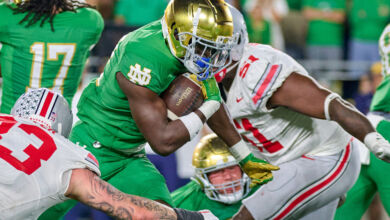
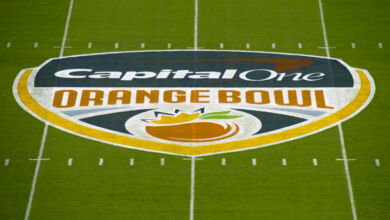
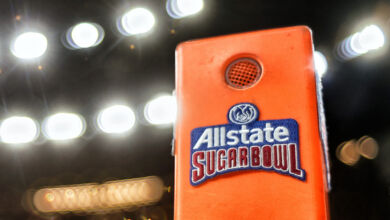
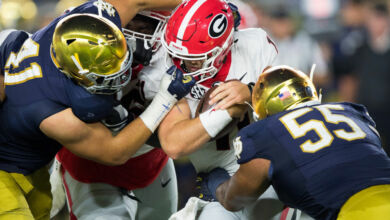
Thank you for your comment & I’m glad you enjoyed the article!
Cheers!
Lisa
“Football wasn’t my first love, I really wanted to run track at the collegiate level. My dream was to go to the Olympics and be like Carl Lewis. My two races were the 100-meter and 200-meter dash.”
This quote sounds like me 42 years ago.
I always enjoy recognition of past athetic & acadenmic achievement/prowess in that we pay tribute. We teach. We learn. Within ye article a recognition of success is restablished once again in a variety of ways.